Boss Blu-ray Movie
HomeBoss Blu-ray Movie 
Blu-ray + DVDKit Parker Films | 1975 | 93 min | Rated PG | Aug 14, 2018
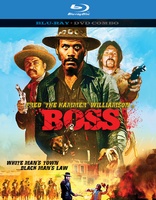
Movie rating
6.5 | / 10 |
Blu-ray rating
| Users | 3.0 | |
| Reviewer | 3.0 | |
| Overall | 3.0 |
Overview
Boss (1975)
Two black bounty hunters ride into a small town out West in pursuit of an outlaw. They discover that the town has no sheriff, and soon take over that position, much against the will of the mostly white townsfolk. They raise hell, chase women, and milk the locals for cash, while waiting for the opportunity to get their man.
Starring: Fred Williamson, D'Urville Martin, R.G. Armstrong, Don 'Red' Barry, Barbara LeighDirector: Jack Arnold (I)
| Western | Uncertain |
| Comedy | Uncertain |
Specifications
Video
Video codec: MPEG-4 AVC
Video resolution: 1080p
Aspect ratio: 2.55:1
Original aspect ratio: 2.39:1
Audio
English: LPCM 2.0 (48kHz, 16-bit)
BDInfo
Subtitles
English SDH
Discs
Blu-ray Disc
Two-disc set (1 BD, 1 DVD)
DVD copy
Playback
Region A, B (C untested)
Review
Rating summary
| Movie | 3.0 | |
| Video | 2.5 | |
| Audio | 3.5 | |
| Extras | 1.5 | |
| Overall | 3.0 |
Boss Blu-ray Movie Review
Maybe Man with No Name would have been a less controversial choice.
Reviewed by Jeffrey Kauffman December 29, 2018There’s been a lot of shocked reaction if not outright indignation lately (well, maybe longer than merely “lately”, but I digress) over some uses of the so-called “n word”. Some of the umbrage has been understandable, leveled at bigots or other provocateurs who have continued to use the pejorative, often in an obvious attempt to simply rile people up. But other recent uses, including a well publicized supposed gaffe by Viggo Mortensen, have frankly left me kind of scratching my (probably liberal leaning) head as to where the PC police are going to go next. Mortensen was upbraided for using the word as he spoke about his film Green Book at a screening, where he (according to himself, so caveats as needed) was trying to make the point that the now despised word was rather common (if still used pejoratively) in the era when the film was set. Now you can certainly make the case that Mortensen’s formulation of his thesis was inartful, and he could have easily substituted the coinage “n word” in place of the actual word, but even so, were his comments actually malicious in intent and deserving of such unabashed outrage? I'm not pretending to know (or have) any answers, I'm simply saying that for me personally the many issues surrounding this hateful word still continue to raise questions about how we're supposed to respond in terms of who is using the word and why. All of this is to say, it’s kind of interesting that somewhere along the way Kit Parker Films decided it was wiser to bring this film out under one of its (many) alternate titles, Boss, at least with regard to the outside of its reversible cover, rather than the title that it originally had and which is still emblazoned in the opening credits (as well as the kind of funny theme song), Boss N*****, and which is still featured on the reverse cover image. (Until I replaced it, our listing had the inside cover art that contains the original title.) Now, it’s long been a tenet of black friends of mine that they have the right to use the “n word” should they so choose (a salient point to consider in terms of my aforementioned questioning about how to respond vis a vis who is using the word and why), and in that context it’s important to understand that Boss was the brainchild of star, writer and co-producer Fred Williamson, who was obviously trying to make his own kind of point about “Black Power”, especially since an underlying plot point of the film is that Williamson’s character more or less appoints himself sheriff of a dusty western outpost.
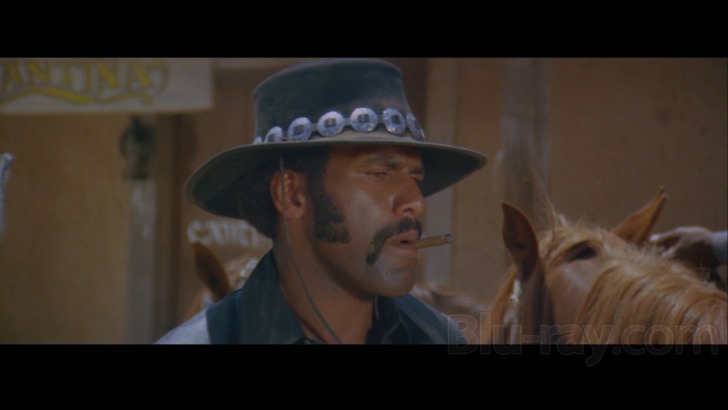
Some of the press materials that accompanied the relatively recently reviewed 1945 referenced westerns where “strangers” appear in an otherwise insular society, even though that particular film was set in the waning days of World War II and involved Jews arriving in a Hungarian village. Something at least a little similar is at play in Boss, with two black bounty hunters, Boss (Fred Williamson) and Amos (D’Urville Martin), arriving in the decidedly Caucasian San Miguel after having dispatched a bunch of thieves in the film’s opening moments. One of those bad guys was evidently about to be appointed sheriff of San Miguel, and Boss’ quick thinking and semi- menacing mien end up making him literally “the new sheriff in town”. Kind of interestingly within the context of the film’s title, Boss and Amos end up enforcing a whole bunch of “black laws”, including jail time for anyone (whites, since that is virtually the rest of the population) calling either Boss or Amos the “n word” in public.
The basic "good guys versus bad guys" aspect of Boss is actually fairly rote, as is the sidebar of a corrupt local government in league with the bad guys (perhaps for semi-noble intentions in terms of keeping the populace safe), but it's the subtext of Boss that really makes this a fascinating viewing experience. There's rather piquant material here with regard to race relations (some Hispanics, notably a local child, have tragic interactions with gringos), and the film is both bracingly honest and also kind of slyly humorous at times. Williamson is his typical macho self here, managing to catch the eye of women no matter what their race.
Boss Blu-ray Movie, Video Quality 
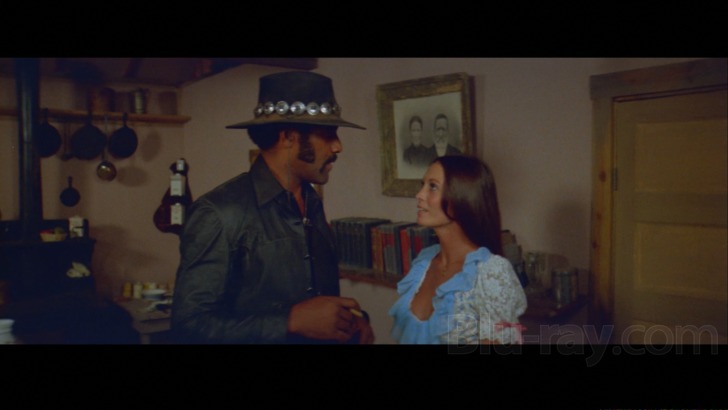
Boss is presented on Blu-ray courtesy of Kit Parker Films and MVD Visual with an AVC encoded 1080p transfer in 2.54:1, though a copyright notice mentioning Blair and Associates may indicate that VCI was also involved in this release. While I'm not willing to attribute all the oddness in this presentation to the actual encode, there are definitely issues throughout Boss that may well bother a lot of videophiles. There are consistent fluctuations in brightness, contrast and color temperature, along with some prevalent damage that may suggest whatever source element was utilized was badly damaged. But gamma levels just seem way out of whack here, and the entire presentation looks jaundiced, to the point that Williamson's skin tones kind of verge on orange at times. Grain seems to have been filtered fairly aggressively a lot of the time, but then can suddenly kind of appear in a splotchy yellow fashion at other points, as can be seen in some of the screenshots accompanying this review. Some of the outdoor material here actually pops rather well, with a more natural looking palette, but one way or the other, this could have used some serious restoration, color correction and whatever other tools might have been judiciously applied to give it a more pleasing appearance.
Boss Blu-ray Movie, Audio Quality 
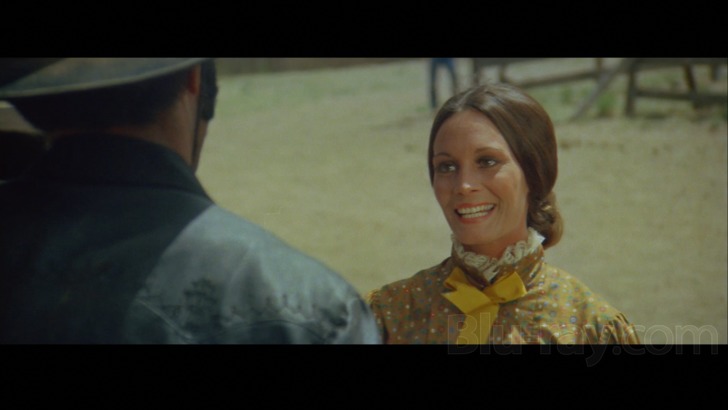
Boss's LPCM 2.0 mono track fares better than its video presentation, with a reasonably full bodied sound that offers good support for the anachronistically contemporary (meaning 70s) sounding soundtrack (including a theme song that seems inspired at least in part by Shaft). Dialogue and effects like gunfire resonate well enough, but the track has a slightly thin quality in its lower end that makes other effects like galloping horses sound a little hollow at times.
Boss Blu-ray Movie, Special Features and Extras 
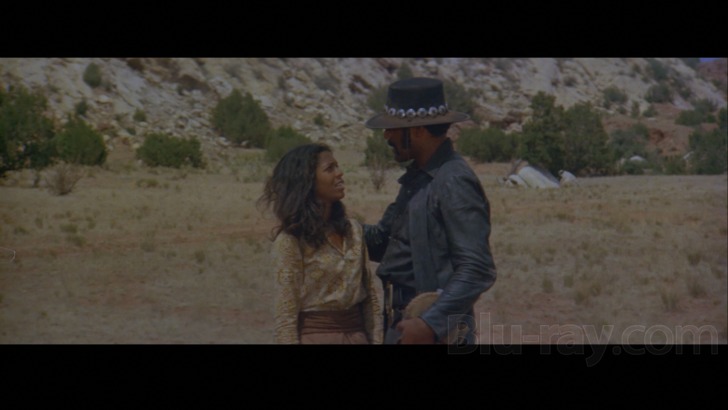
- Original Theatrical Trailer (1080p; 2:30) is pretty badly damaged, but still has arguably better looking color and contrast than the feature itself.
- The Boss Memory with Myrl Schreibman (1080p; 7:54) is a sweet if brief piece with Schreibman, who talks about his relationship with director Jack Arnold and some fun (and funny) anecdotes about the shoot.
- Jack Arnold Tribute (1080p; 3:50) offers more of Schreibman's reminiscences.
- A Conversation with Fred Williamson (1080p; 27:11) is an enjoyably far ranging interview hosted by Joel Blumberg.
Boss Blu-ray Movie, Overall Score and Recommendation 
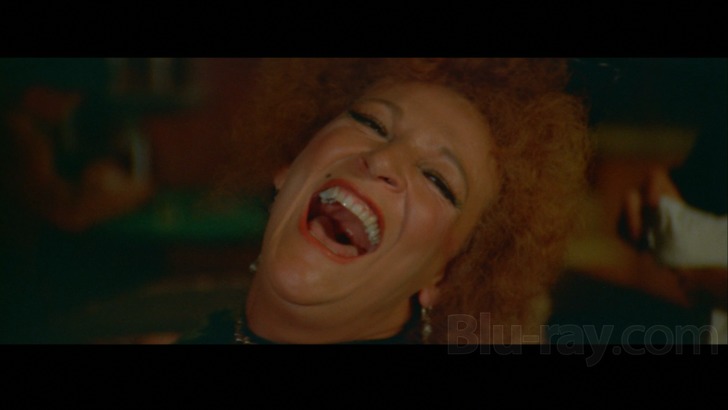
Boss is actually quite provocative in its own way and is one of Williamson's more interesting efforts from his Blaxploitation phase. Fans of the cast or of this genre may well want to check this out, but they are cautioned to carefully parse the screenshots accompanying this review to get some idea of the disc's appearance. The supplementary interviews are quite charming.
Similar titles
Similar titles you might also like

Vengeance
1968

They Call Me Trinity
Lo chiamavano Trinità...
1970

A Long Ride from Hell
1968

The Specialists
Gli Specialisti
1969

Destry Rides Again
1939

Death Rides a Horse
Da uomo a uomo | Special Edition
1967

Navajo Joe
Special Edition
1966

My Name Is Nobody
Il mio nome è Nessuno | Mi Nombre es Ninguno | 40th Anniversary Edition
1973

Cemetery Without Crosses
The Rope and the Colt / Une corde, un Colt...
1969

The Grand Duel
Il grande duello / The Big Showdown
1972

No Name on the Bullet
1959

The Big Gundown
La resa dei conti
1966

The Tin Star
Limited Edition
1957

Showdown at Boot Hill
1958

The Last Sunset
El Perdido
1961

Sabata
Ehi amico... c'è Sabata, hai chiuso!
1969

Badland
2019

The Magnificent Seven Ride!
1972

Joe Kidd
1972

Ace High
I quattro dell'Ave Maria
1968